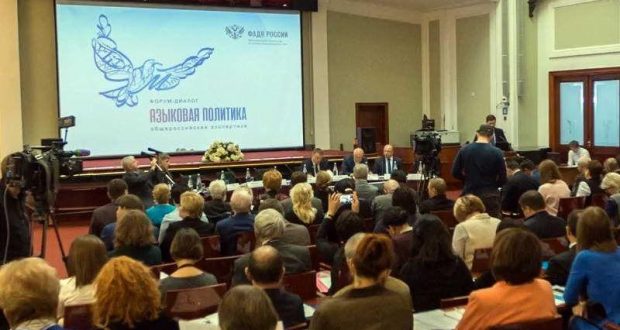October 28, 2019
The dialogue forum “Language Policy: All-Russian Expertise”, organized by the Federal Agency for Nationalities (FADN), brought together the best linguists and experts on the development of native languages of Russia. In Moscow, at the Chamber of Commerce and Industry of the Russian Federation, a program to preserve and develop their native languages and promote the world language of international communication – Russian has been developed.
– The Russian language unites Russian society and the entire Russian world. – said head of the FADN Igor Barinov. – Its strength lies in supporting native languages, in terms of state support of which our country occupies one of the leading positions in the world. The success of strengthening the Russian language and the languages of the peoples of Russia is always evident: languages, when they feel good, harmonize interethnic and interreligious relations.
All three expert sections of the forum – “Russian as an instrument of super-ethnic consolidation of society”, “Native languages of the peoples of Russia” and the section of heads and specialists of government bodies — worked on compilation of a “road map” for preserving native languages. It is compiled on the basis of the “Concept for the study of native languages” adopted in 2018.
“We have many problems with our native languages,” said Ildar Gilmutdinov, head of the State Duma Committee on Nationalities. – Russian is growing stronger, as it unites everyone, there is a renaissance of seven million-plus languages - Tatar, Chuvash and five Caucasian, but there is a reluctance to speak native languages, especially among the peoples of Siberia, the Far East and the North. To preserve the linguistic diversity, the “Concept”, and now the forum, offers both a federal and a network of regional “road maps”. Regional maps should be built by native speakers, and the federal must lay approaches, resources and funding.
Gilmutdinov believes that there is a paradoxical situation when the state guarantees study of native languages, but all responsibility is shifted to the municipal level. “At the same time, there is no normal basis for language policy on the ground, and this should be dealt with in the center,” he said. But the regions must understand that the initiative is in their hands. “They should not wait for someone to come from the center and work out a language policy for them.”
The forum especially drew attention to the fact that out of 193 languages and 84 dialects spoken by Russians, 18 languages are on the verge of extinction, 14 languages have died since 1990, and ten are in crisis. At the same time, out of 24 languages in which training is conducted, textbooks are available for only 9 languages. 10 training programs for different languages have been developed, and about 10 more are being developed. Now the task of the “road map” compiled by the forum with the mediation of the Fund of Languages and the Institute for the Support and Development of Mother Tongues is to systematically strengthen mother tongues. As expected, the roadmap and its regional “sisters” will monitor the situation – monitor how 104 textbooks will be published in 2019 in seven million-plus languages (so far more than 90 textbooks have been published). In 2020-2021, it is expected that 124 textbooks in 24 native languages will be published.
“These proposals for preservation and development of native languages and promotion of the Russian language in the world,” said State Duma deputy and head of the Russkiy Mir Foundation Vyacheslav Nikonov at the forum, “improve not only organization of the educational process, but also set a vector for the formation of an all-Russian civic identity.
rg.ru

